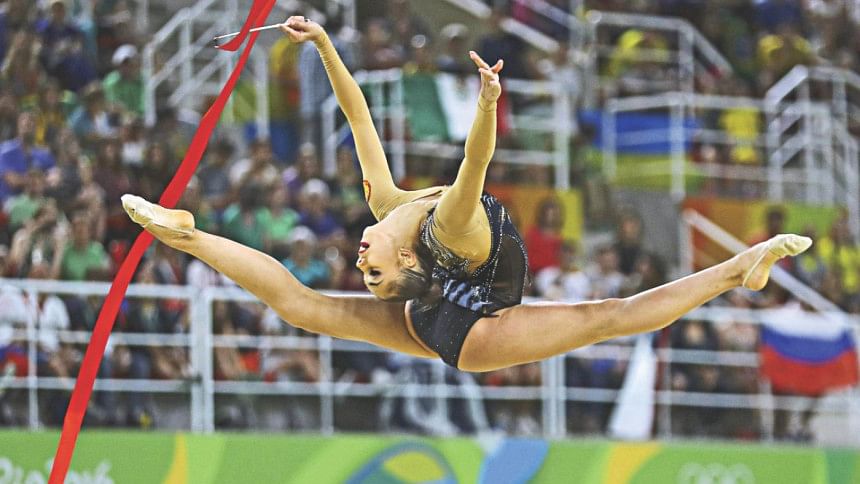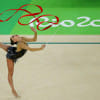'A win for two countries'

Her first name is Margarita, and she hailed her gold medal in all-around rhythmic gymnastics in the Rio Olympics on Saturday as a 'victory for two countries'. She is representing the Russian Federation but the other country celebrating her triumph is Bangladesh.
Margarita Mamun was born in Moscow to a Bangladeshi father and a Russian mother -- Anna -- a former rhythmic gymnast herself. Her father Abdullah Al Mamun, a Bangladeshi engineer, settled in Moscow where the gold medallist grew up.
"I'm really happy knowing that I have a lot of fans in Bangladesh who have been supporting me," Mamun said in Russian after her victory.
As far as the Olympic Games are concerned, Bangladesh has the unfortunate distinction of being the most populous country never to have won a medal. So even though it will be Russia's medals tally that is bolstered by the 20-year-old's success, it is a fillip for the nation from which her father hails and with which she felt a connection strong enough to represent Bangladesh in a junior event.
Bangladesh Gymnastic Federation (BGF) officials were understandably thrilled with the world number one rhythmic gymnast's nod to her father's former homeland.
“Certainly we are very proud of her achievement in the Olympics and her comments on Bangladesh. It is not possible to achieve anything on a big stage like the Olympics, especially because of the way we have been handling our sport. Her achievement is also a kind of success for us at international level as she is of Bangladeshi descent,” said BGF general secretary Ahmedur Rahman Bablu yesterday.
"I had dual citizenship so that's why I decided to represent Bangladesh in one competition as a junior. I came back to represent Russia as I always lived and trained in Russia," Mamun added after her victory.
The primitive nature of the state of gymnastic, not to mention a sub-category like rhythmic gymnastics, was thrown into stark relief when Rahman could not even recall when Mamun represented Bangladesh in junior competition.
“I can remember that one day her father came to the federation to talk about his daughter's participation in an international junior meet and he had filed a form but it did not pan out later. Maybe there was lack of initiative from both sides,” said Rahman.
“To tell the truth, we don't have the infrastructure and coach for rhythmic gymnastics. And we were not capable of providing many things that a gymnast needs to practise,” said Rahman, who was then the joint-secretary of the federation. Their only other similar experience with a foreign-born Bangladeshi gymnast -- US-born Syque Caesar -- in the Commonwealth Games and Asian Games but Caesar failed to produce any medals.
Rahman yesterday checked the documents for Mamun's participation at his federation office at the Bangabandhu National Stadium but could not uncover anything.
Coach Kazi Akram Ali, who is now the joint secretary of the federation, was alerted by media reports that a girl of Bangladeshi descent won an Olympic gold, after which he recalled that the girl in question had once practised in Bangladesh.
“A girl named something Mamun accompanied by her mother used to practise at the gymnasium of the National Sports Council one or two days a week for one or two years when her father was employed in Bangladesh, but I can't remember that year or her age -- she might have been eight or nine,” said Ali, who that time supervised the gymnasts of the Bangladesh Textile Millis Corporation at the NSC gymnasium.
“She generally practiced basic movements of gymnastics in line with the instruction of her mother. She never seemed to be a talented gymnast, rather she was a bit slow which is not ideal for artistic gymnastics,” said Ali. “It was beyond my dream that she will one day become a brilliant gymnast and win a gold medal in the Olympics. It is a great achievement for her as well as Bangladesh as she is of Bangladeshi descent,” said the 57-year-old Ali, who is now a coach at the Bangladesh Krira Shikkha Protisthan.
"I can count one to 10 in Bengali. When I was younger my dad used to teach me Bengali but I have forgotten it all," said Mamun, revealing her affinity for her father's origins.
It is clear that the heritage of having a gymnast mother played a much more pivotal role in her ascent to the gold then her Bangladeshi lineage. It is moreover a reminder to Bangladesh of its floundering gymnastic culture. Above all, it is a credit to Mamun herself that she retains such affection for Bangladesh.

 For all latest news, follow The Daily Star's Google News channel.
For all latest news, follow The Daily Star's Google News channel. 






Comments